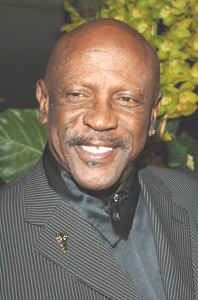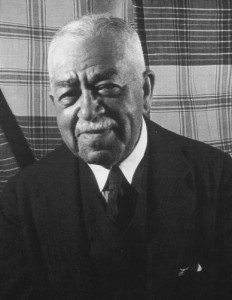
Louis Gossett Jr.
Written by Harry Clark
Music: Dvorak, Burleigh, Negro spirituals
1M: Harry Burleigh
2M: pianist and singer (baritone) with orchestra
“You have great locomotives and great skyscrapers and the streets are filled with people speaking every language in every skin color imaginable. This diversity represents opportunities, not obstacles.” Antonin Dvorák soon after arriving in America
“In Negro spirituals my race has pure gold, and they should be taken as the Negro’s contribution to artistic possessions. In them we show a spiritual security as old as the ages.” Harry Burleigh

Harry Burleigh
Anyone who’s ever experienced an American spiritual has Harry Burleigh to thank. No, he did not compose any, for as he stated, “The spirituals were never ‘composed,’ but sprang into life, ready made, from the white heat of religious fervor during some protracted meeting in camp or church.” What Harry Burleigh did was to capture them on paper, and, in deceptively simple but elegant realizations, hand to the world America’s true folk songs.
Harry Burleigh’s story is inextricably connected to Antonin Dvorak. In 1892, Dvorak set sail from his native Bohemia to New York to assume the directorship of New York’s National Conservatory of Music. Dvorak spent the next three years teaching composition to a few select students and leading the school orchestra in six public performances each season. His most profound friendship was with Harry T. Burleigh, grandson of a slave, a student at the conservatory, and his right-hand man in copying scores and general office work. Burleigh, a brilliant vocalist and budding composer, in turn introduced Dvorak to America’s hidden gems—singing the folk songs and spirituals of his people and discussing with him the possibilities of using this music as inspiration for a major composition. Soon after, Dvorak used some of these songs as the basis for his symphony “From the New World.”
Dvorak left America in 1895 never to return. He died in 1904. Burleigh never again saw his mentor, but had a brilliant life in music—singer, composer, musical organizer—until his death in 1949. He accomplished great things despite the enormous obstacles put before him because of his race.
Lou Gossett Jr. premiered this work and was bowled over by Burleigh’s story; “My new hero,” he exclaimed.
Special note must be made of several gorgeous art songs of Burleigh’s discovered for this show. These exhibit no trace of spirituals but are more French in character, Fauré perhaps. And a touch of Dvorak, too.
